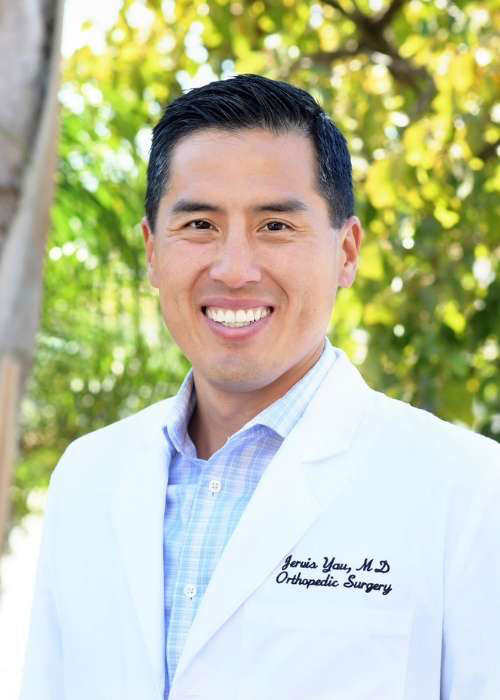Knee Cartilage Injury Specialist

Are you an athlete who participates in contact sports? If so, you may be at risk of sustaining a knee cartilage injury. Cartilage injuries are often caused by trauma, contact sports, repetitive weight bearing, and age related degeneration. Knee cartilage injury specialist, Dr. Jervis Yau provides diagnosis and both surgical and nonsurgical treatment options for patients in Santa Barbara who have sustained a knee cartilage injury. Contact Dr. Yau’s team today!
Knee Cartilage Injury Overview
Articular cartilage is a special form of soft tissue that lines every joint surface in the human body. It serves a critical role in knee function by allowing the bones to move fluidly during motion and also disperse force efficiently across the joint during knee loading. When cartilage begins to deteriorate from overuse, injury, or aging, patients often experience knee pain along with other troublesome symptoms. Orthopedic knee specialist serving the Santa Barbara, Goleta, Santa Maria and Ventura, California communities, Dr. Jervis Yau specializes in returning patients to their active lifestyles after sustaining a knee cartilage injury.
Patients typically experience cartilage injury from a traumatic injury, repetitive use or degeneration through the natural aging process. Unfortunately, cartilage does not have the ability to heal on its own like other structures within the knee joint. If an injury is left untreated, further deterioration of the cartilage can lead to chronic knee joint pain and development of osteoarthritis.
There is a spectrum of knee cartilage injuries that vary from mild to severe. Some patients may develop a cartilage defect so severe that the underlying bone is exposed. The cartilage that is disrupted can break away and float around the knee joint. These loose pieces of cartilage are commonly known as “loose bodies” and can lead to mechanical catching and locking of the knee.
Knee Cartilage Injury Symptoms
The hallmark symptom of a knee cartilage injury is knee joint pain and swelling.. Sometimes, patients may get the sense of the knee giving way when they load into the cartilage defect. Other symptoms include mechanical locking and catching of the knee joint due to loose bodies being lodged within the joint.
Knee Cartilage Injury Diagnosis
Dr. Yau will perform a thorough medical review and physical examination in order to diagnose if a cartilage injury is the cause of knee pain. During the examination, he will compare the injured knee to the normal knee in order to look for visible differences. X-rays and an MRI scan are commonly ordered to view the bony and soft tissue structures in greater detail to confirm and assess the severity of the diagnosis.
Knee Cartilage Injury Treatment
Treatment to alleviate knee joint pain caused by a cartilage injury depends on injury location, size, depth of cartilage defect, patient’s age and patient’s activity level.
Non-Surgical
Dr. Yau commonly begins treatment for a knee cartilage injury with a conservative approach. A combination of rest, ice, modified activities and elevation are typically initiated along with medications to reduce inflammation and pain. Physical therapy plays a crucial role to restore mobility and strength back to the injured knee.
Surgical
If the knee cartilage injury is too severe or does not respond to non-surgical treatment, Dr. Yau will recommend surgery. The correct procedure will be determined based on injury severity, lesion size and patient’s age and activity level. Common procedures include:
- Debridement - Special arthroscopic instruments are used to smooth the shredded or frayed cartilage.
- Microfracture - Creating small holes in the subchondral bone to allow for healing cells to flow into the defect and stimulate fibrocartilage formation.
- Osteochondral autograft/allograft transfer - This technique replaces the defect with a cartilage-bone unit that is procured from the patient (autograft) or donor (allograft). This procedure is ideal in situations where the underlying bone is damaged along with the cartilage.
- Autologous Chondrocyte Implantation (ACI) - This is a two-step procedure where articular cartilage is biopsied from the patient’s knee during the initial arthroscopy and sent to a lab where the chondrocytes (cartilage cells) are processed and grown. When ready, the cells are re-implanted into the cartilage defect under a special patch to facilitate healing.
- De Novo Juvenile cartilage – Juvenile donor cartilage is processed and sterilized and can be transplanted into a cartilage defect in a one stage procedure. Juvenile cartilage has 10x the density of chondrocytes than adult cartilage and does not elicit an immune response.
- Meniscus Surgery - Using special arthroscopic instruments, a portion of the torn meniscus may be repaired or removed to eliminate symptoms.
For additional information on knee joint pain caused by a knee cartilage injury, please contact Dr. Jervis Yau, orthopedic knee specialist serving the Santa Barbara, Goleta, Santa Maria and Ventura, California area.